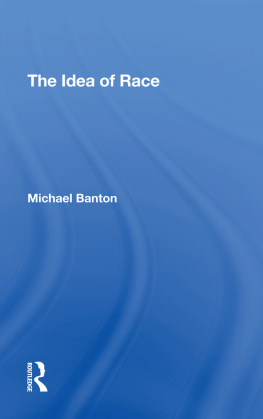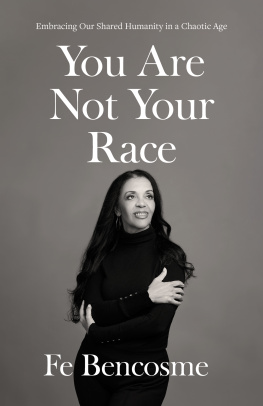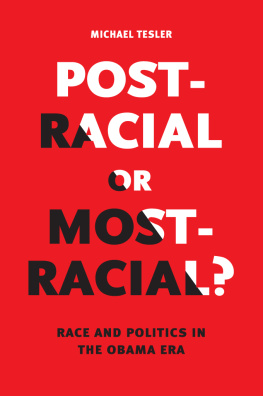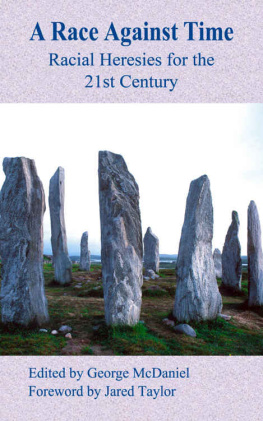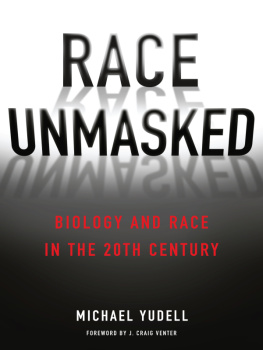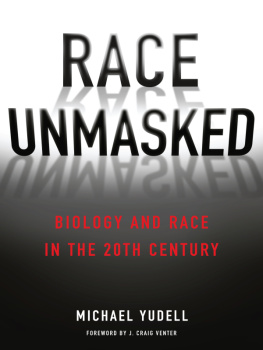RETHINKING RACE
The Case for Deflationary Realism
MICHAEL O. HARDIMON
Cambridge, Massachusetts
London, England
2017
Copyright 2017 by the President and Fellows of Harvard College
All rights reserved
Jacket design: Graciela Galup
978-0-674-97566-8 (hard cover : alk. paper)
978-0-674-97838-6 (EPUB)
978-0-674-97847-8 (MOBI)
978-0-674-97844-7 (PDF)
The Library of Congress has cataloged the printed edition as follows:
Names: Hardimon, Michael O., author.
Title: Rethinking race : the case for deflationary realism / Michael O. Hardimon.
Description: Cambridge, Massachusetts : Harvard University Press, 2017. | Includes bibliographical references and index.
Identifiers: LCCN 2016043670
Subjects: LCSH: RacePhilosophy. | RaceSocial aspects. | Post-racialism.
Classification: LCC GN269 .H36 2017 | DDC 305.8dc23
LC record available at https://lccn.loc.gov/2016043670
TO MY PARENTS,
who taught me the basics about race
Contents
- The Racialist Concept of Race
- The Minimalist Concept of Race
- Do Minimalist Races Exist?
- Is Minimalist Race Biologically Real?
- The Populationist Concept of Race
- Populationist Race: Existence and Reality
- The Concept of Socialrace
- Health, Race, Medicine
Once upon a time, a long, long time agoway back in the late 1950stwo families were walking home from a restaurant one evening in Chicagos Hyde Park. The four adults were walking together. The two children, a boy and a girl, both around four, were walking together, too. The little girls name was Lisa. Her mother was white and her father was white. The little boys name was Michael. His mother was white and his father was black.
As it happened, the two children walked off onto a school playground they were passing. They were approached by three boys around their age who were black. One of the three asked Michael, What color are you? Michael was flummoxed. Surely the little boy could see perfectly well what color he was! It was still daylight. So why was he asking that? What was he asking? Michael had a sense that more was being asked about than the color of his skin. But he didnt know exactly what. He muttered something about the color he was inside, an answer that struck him as lame even at the time. The boy responded quite reasonably, Fine, what color are you inside? Whatever Michael said in reply is lost to history. All I can rememberfor the Michael in the story was mewas not knowing how to answer the question.
In retrospect it is obvious that I was being asked about my understanding of my racial identity, about who and what I took myself to be. I date this episode as the beginning of my puzzlement about what race is.
This book is an essay in the metaphysics of race. It seeks to provide a philosophical answer to a single basic question: namely, what, if anything, is race in human beings? In asking this question, we do not suppose that we know at the outset whether race is biological or social. Nor do we suppose that we know whether races exist or do not exist or whether race is real or unreal. Nor again do we suppose that race is one thing. The question is intended to be maximally open ended. Answering it requires that we pay close attention to the very different ways in which we speak of race and that we be alive to the possibility that we are often muddled and confused. Answering it requires that we be prepared to do the detailed analytical work required to arrive at a clear and perspicuous view. Doing this work is vital because of the practical importance of race. The books larger political context is set by the manifold social and political conflicts associated with race that afflict the United States. These conflictsand the fact of racismgive practical urgency to the metaphysical question, What is race?
We will find that race is a complex but tractable phenomenon best understood through the articulation of a series of four distinct but interrelated concepts:
- The racialist concept of race: The familiar pernicious traditional, essentialist, and hierarchical race concept often mistakenly identified as the race concept. It maintains that races have intrinsic biological essences, are distinguished by normatively important features such as intelligence and moral character, and can, on the basis of these features, be objectively ranked as superior and inferior.
- The minimalist concept of race: The ordinary concept of race, stripped down to its barest bones. It captures what is rational in the ordinary concept: the ordinary concepts logical core. A nonracialist conceptit does not invoke the idea of intrinsic biological essences or normatively important features, nor does it posit a correlation between such features and visible physical charactersthe minimalist concept of race maintains that races are distinguished by differences in patterns of visible physical features (skin color, hair texture, nose shape, and so on) corresponding to differences in geographical ancestry.
- The populationist concept of race: A nonracialist (nonessentialist, nonhierarchical) candidate scientific concept that characterizes races as groups of populations belonging to biological lines of descent, distinguished by patterns of phenotypic differences, that trace back to geographically separated and extrinsically reproductively isolated founding populations.
- The concept of socialrace: The nonracialist, critical, emancipatory concept of social groups that are taken to be racialist races.
Taken together, these terms provide a language that makes it possible to think and speak coherently about race.
The books immediate polemical context is set by eliminativism about race, the view that dominates the discussion of race at the present time. It holds that the following are true:
(i) The word race and the concept RACE as applied to human beings should be eliminated from our vocabulary.
(ii) The biological category or kind race as applied to human beings should be eliminated from our ontology.
To eliminate race and RACE from our vocabulary is to remove them from the list of words and concepts we are willing to use. To eliminate race from our ontology is to remove it from our official list of what there is.
The eliminativists basic reason for removing race from our ontology is empirical. Science, they claim, has shown that human races do not exist. There are no races. Just as we have jettisoned the kind phlogiston from our ontology, so tooand for the same reasonwe should jettison the kind race. As for the elimination of the word and concept, the first reason eliminativists give is semantic (in the philosophers sense of the word): the word and concept do not refer. Race and RACE are vacuous or empty. There are no races. The second reason they give is moral. The word race is virulent.
Rethinking Race represents a critical response to eliminativism. It maintains that, although


